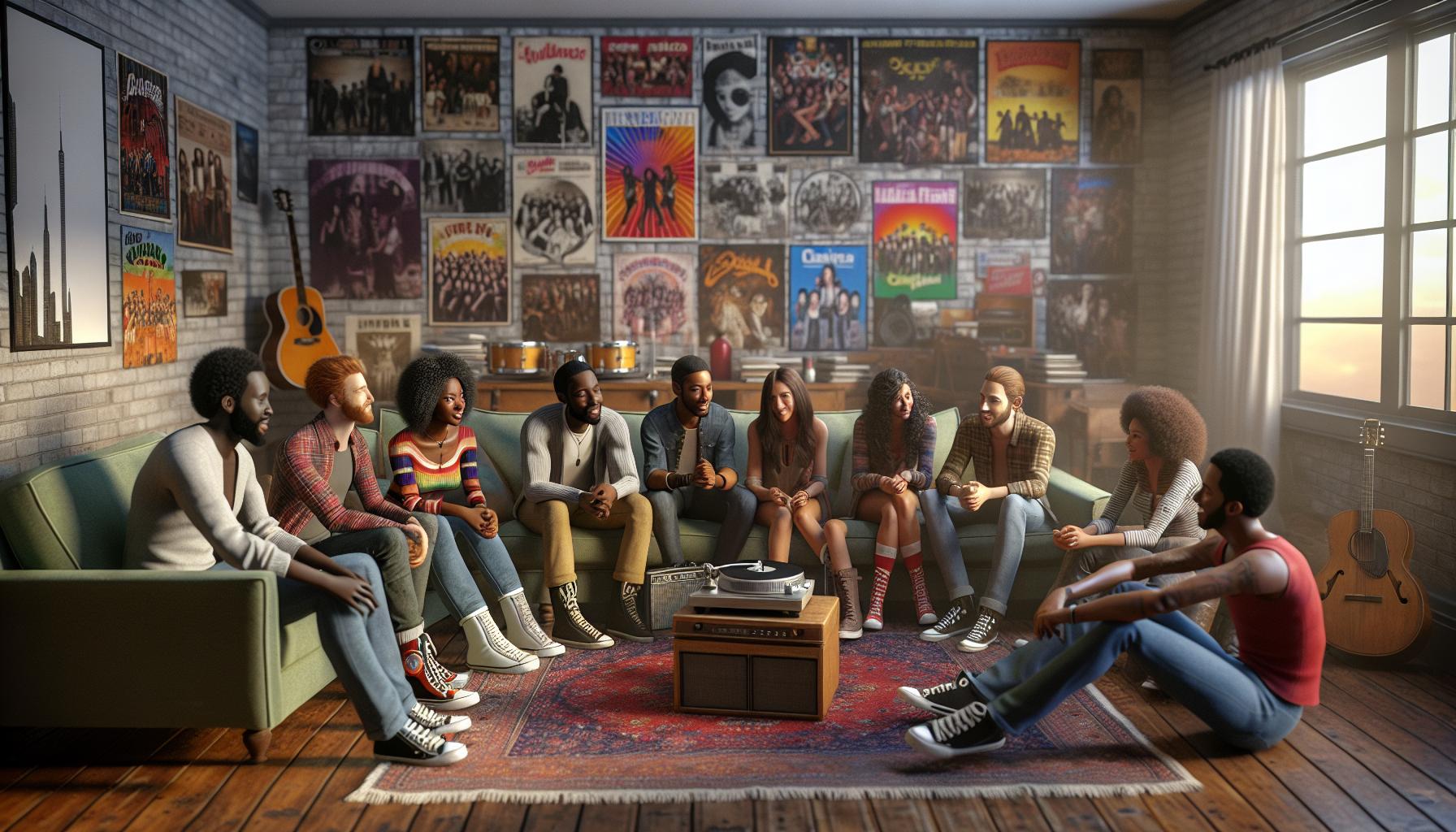Music has a unique way of connecting people, sparking conversations, and igniting curiosity. Whether it’s discovering a friend’s favorite album or diving into the stories behind iconic songs, asking the right questions can lead to fascinating discussions. Engaging with others about music not only deepens relationships but also enhances understanding of diverse tastes and experiences.
In this article, readers will find a curated list of thought-provoking music questions to ask friends, family, or even strangers. These questions are designed to uncover hidden gems in personal playlists and explore the emotions tied to different genres. By sparking these conversations, one can create memorable moments and perhaps even discover a new favorite track along the way.
Key Takeaways
- Fostering Connections: Asking music questions enhances interpersonal relationships by sparking meaningful conversations and shared experiences.
- Exploring Personal Stories: Personalized questions encourage individuals to reflect on their unique musical journeys, revealing emotional connections to specific songs and genres.
- Understanding Diversity: Engaging with genre-specific inquiries promotes empathy and appreciation for varying musical tastes, enriching conversations with cultural insights.
- Formulating Effective Questions: Open-ended questions generate deeper discussions, while tailored, reflective queries prompt significant insights into personal experiences with music.
- Dynamic Engagement: Active listening and thoughtful follow-up questions create a more engaging interaction, encouraging participants to share and connect on a deeper level.
- Versatile Applications: Music questions can be used in various settings, including social gatherings and educational environments, to facilitate connections and enhance engagement.
Music Questions To Ask
Music questions serve as essential tools for building connections and deepening relationships. Engaging in conversations about music fosters a shared experience, facilitating discussions about personal preferences and emotional responses to different genres. These questions guide individuals toward discovering each other’s unique tastes and meaningful memories associated with specific songs.
Understanding diverse musical backgrounds enriches interactions. By exploring music-related inquiries, individuals gain insights into cultural influences, shaping perspectives on various genres. This understanding promotes empathy and appreciation for differing tastes.
Music questions also stimulate creativity and introspection. They encourage individuals to reflect on their own experiences, promoting meaningful storytelling. Sharing musical discoveries opens avenues for participants to express themselves and articulate emotions influenced by music.
Thus, asking music questions enhances not only interpersonal connections but also personal growth. The simple act of inquiring about someone’s favorite song or genre lays the groundwork for memorable conversations and profound connections.
Types Of Music Questions

Music questions can be categorized into different types, each serving to enhance discussions about personal experiences and musical preferences. Exploring these categories can deepen understanding and foster meaningful connections.
Personal Experience Questions
Personal experience questions tap into individual memories and emotions related to music. They encourage sharing unique stories and insights, highlighting the personal impact of songs and artists. Examples include:
- What song reminds you of your childhood?
- Which concert left a lasting impression on you?
- How has music played a role in significant life events?
These questions facilitate a deeper exploration of one’s musical journey, allowing for reflections that resonate on an emotional level.
Genre-Specific Questions
Genre-specific questions focus on particular styles of music, revealing unique tastes and preferences. They encourage discussions about diverse musical landscapes. Examples include:
- What makes your favorite genre appealing?
- Which artist from that genre do you admire the most?
- How do different genres influence your mood?
These inquiries lead to insightful conversations about the various elements that define musical genres and the personal significance they hold for individuals.
How To Formulate Effective Music Questions

Creating effective music questions involves understanding the nuances of conversations and knowing how to engage interestingly. The types of questions asked can significantly influence the depth and quality of discussions.
Open-Ended Vs. Closed Questions
Open-ended questions encourage expansive discussions and allow for detailed responses, providing participants the freedom to express thoughts thoroughly. For example, asking “What does music mean to you?” invites a personal narrative. Closed questions, however, typically yield concise answers, often “yes” or “no.” For instance, “Do you like jazz?” limits the potential for deeper insights. Effective music questions should strive to incorporate open-ended formats, as they foster dialogue and uncover diverse perspectives.
- Be Specific: Tailor questions to particular genres or artists to stimulate focused discussions. For example, “What’s your favorite album from the 1990s?” prompts reflection on specific musical trends.
- Encourage Reflection: Pose questions that invite personal memories or emotions, like “How did a particular song shape a moment in your life?” This approach leads to profound insights.
- Practice Active Listening: Engage with responses actively, asking follow-up questions based on what others share, which promotes a dynamic interaction.
- Create Context: Frame questions in relation to shared experiences or current trends in music, such as “What do you think of today’s pop music compared to the past?” This connection increases relatability and interest.
- Be Authentic: Convey genuine curiosity about others’ musical tastes. Authentic questions foster an atmosphere of openness and trust.
These strategies enhance the formulation of music questions, making interactions more meaningful and memorable.
Where To Use Music Questions

Music questions create opportunities for connection in various settings. Utilizing these inquiries can enhance engagement and foster deeper relationships.
Social Gatherings
Social gatherings, such as parties or casual meet-ups, thrive on lively interactions. Music questions serve as excellent icebreakers, prompting attendees to share their favorite songs, memorable concerts, or personal playlists. Examples include asking about the last song they danced to or which artist they would want to see live. Engaging with music can evoke nostalgia and encourage storytelling, making conversations richer and more enjoyable.
Music Classes
In music classes, instructors can employ music questions to foster participation and stimulate discussions on musical concepts. Questions about students’ favorite genres or experiences with different instruments can create connections among peers. For example, asking students to describe a song that inspires them or a musical goal they aspire to achieve encourages self-expression and enhances collaboration. Incorporating music questions into lessons deepens understanding and promotes a supportive learning environment.
Engaging With Music Questions
Engaging with music questions can transform interactions and deepen connections. By exploring personal experiences and preferences, individuals can share meaningful stories that resonate with others. This exchange not only enriches conversations but also fosters empathy and understanding among diverse musical backgrounds.
Incorporating music questions into various settings enhances the enjoyment of social gatherings and educational environments. The right questions can spark creativity and introspection, leading to memorable discussions that leave a lasting impact. Through thoughtful inquiries, people can discover new favorites and form bonds over shared musical journeys. Embracing the power of music in conversation opens doors to profound connections and personal growth.